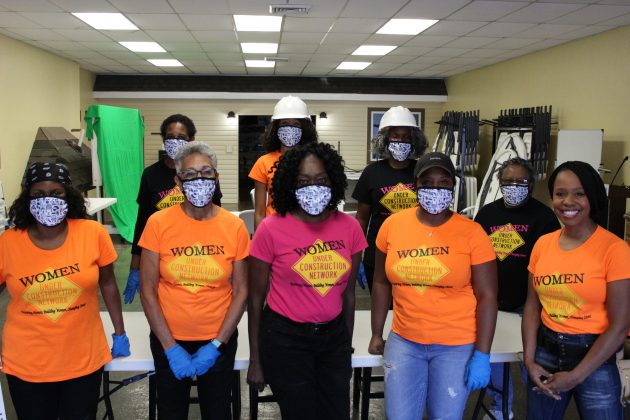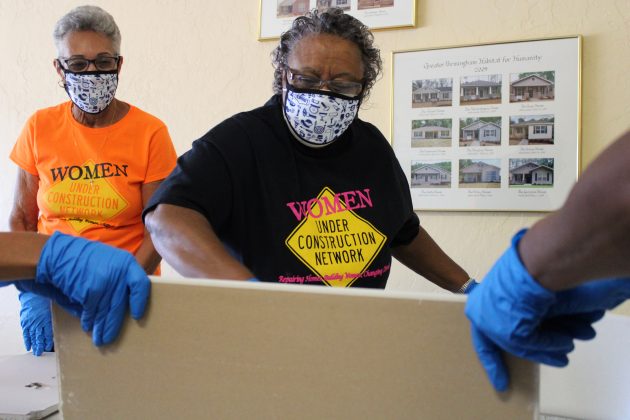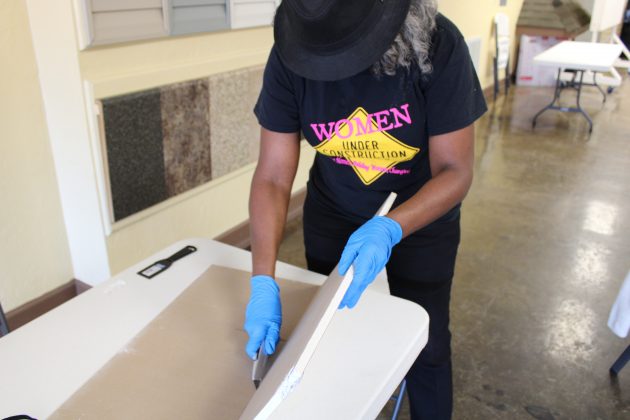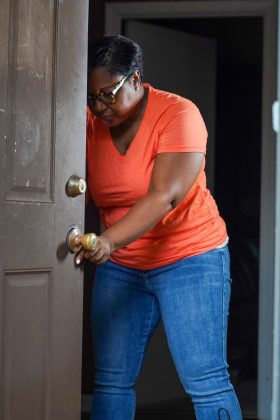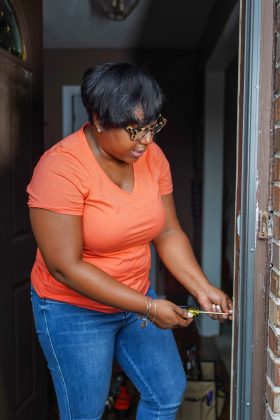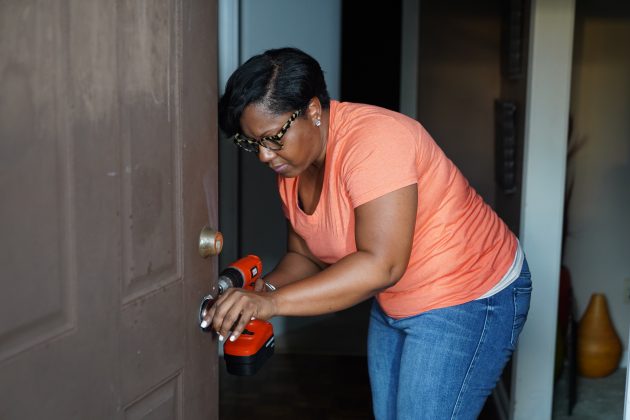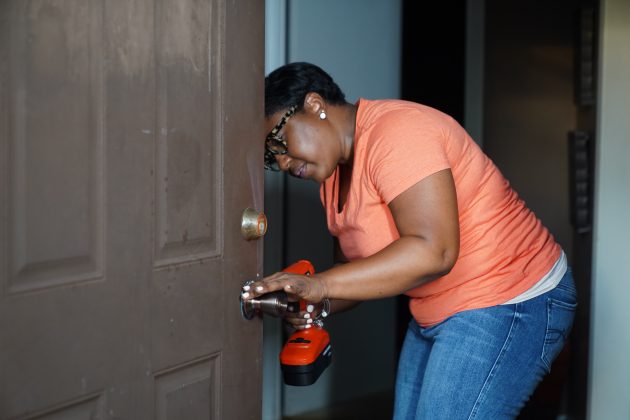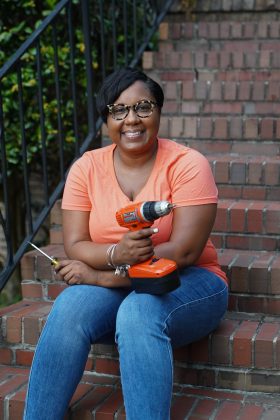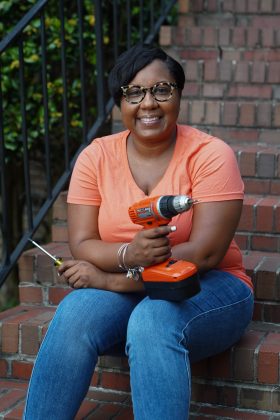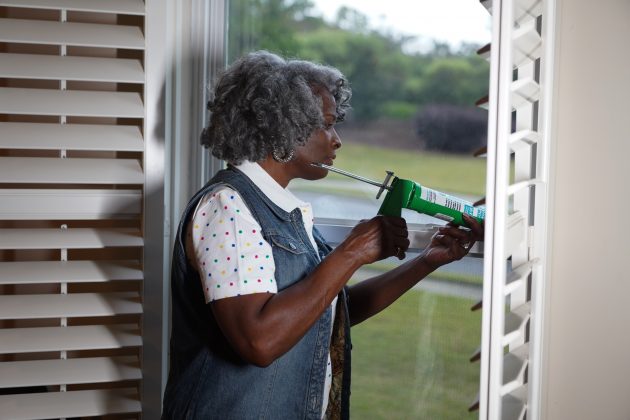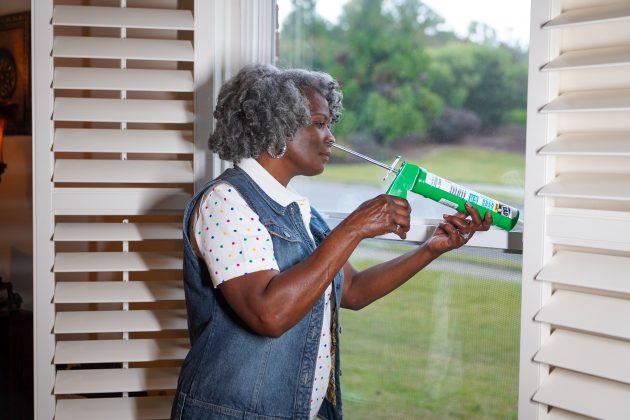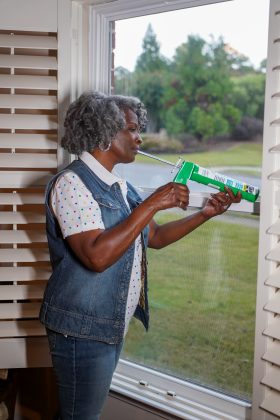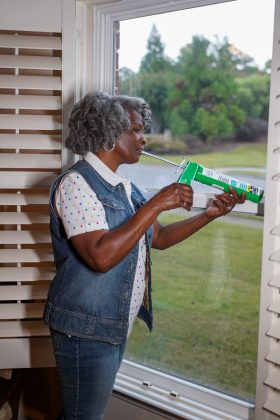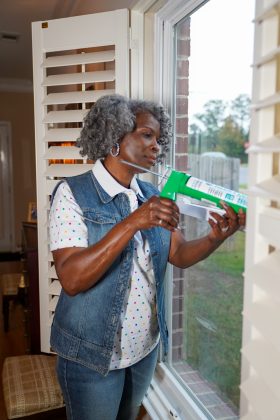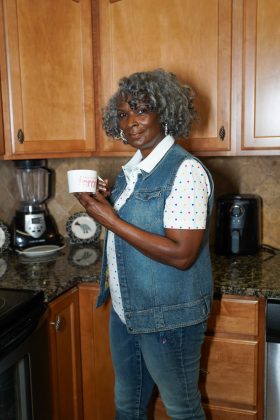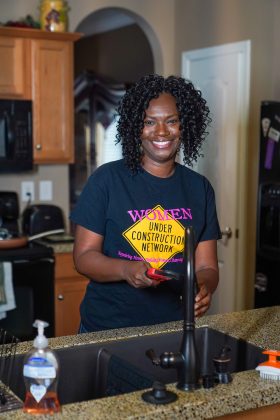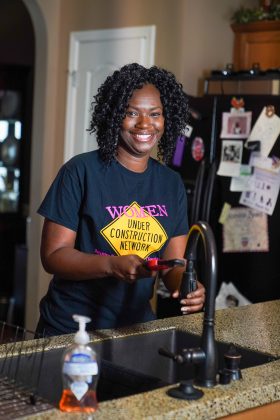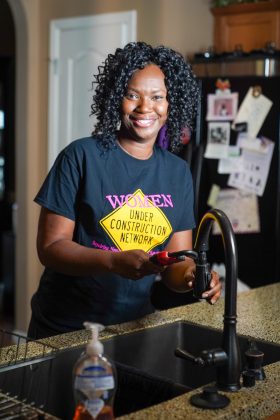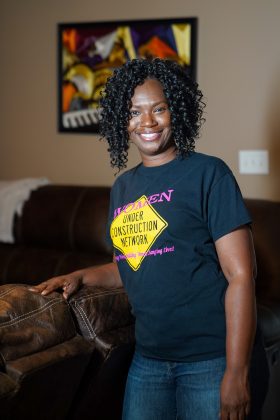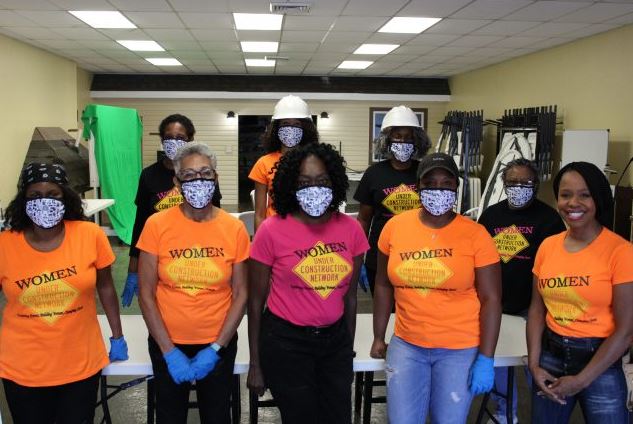
By Sydney Melson
The Birmingham Times
“Educate, motivate, and empower women of all ages facing critical needs at home . . . promote self-sufficiency and provide women with actual tools and the hands-on skills needed to make repairs in their homes . . . view each tool’s function as a parallel to [your] own lives.”
Those are the words of Shellie Layne, Women Under Construction Network (WUCN) founder and chief motivator, found on the group’s website (www.wucnetwork.org)
Here we introduce some of those women and how they are using the tools they acquired from the WUCN to not only repair their homes but also build better lives for themselves and others.
Clotele Brantley: Growing through sisterhood
Living in an apartment for 15 years helped Clotele Brantley of Vestavia Hills, Alabama, avoid home improvement projects but allowed her to focus on one of her loves.
“The one thing that is near and dear to my heart is building and supporting a family and supporting women,” said Brantley, an attorney who learned about the WUCN and became committed to its purpose to help women love themselves and learn that self-esteem is important in their relationships.
Brantley recalled the time she brought a friend to a WUCN event.
“After the event, she talked to me about her past and her childhood, and how being at the WUCN really lifted her up. The woman brought her mother along, as well, and the WUCN helped them both deal with some hurt and some pain they had lived through in their own relationship,” said Brantley, adding that the meeting helped her friend realize that talking about the problems she faced in life was not a sign of weakness.
Brantley said WUCN founder Shellie Layne is an especially supportive part of the group’s sisterhood.
“She takes special time out to get with you, to pray for you. She makes sure you’re surrounded with love and support,” Brantley said, noting that the support is invaluable.
Brantley also commended parents who are raising their children during the ongoing COVID-19 pandemic and encouraged them to find someone to lean on.
“It’s not always about what we’re thinking in our heads. [It’s healthy to] talk to someone and get some outside perspective,” said Brantley, who has been a single mom to two children—Morgan, 28, and Madison, 25—for 15 years.
In 2017, Brantley participated in the WUCN’s What I Learned At Home (WILAH) project, a 10-week, grant-funded workshop, in partnership with Habitat for Humanity, that teaches women the basics of home repair.
“It was kind of like a self-help group,” she said. “Each week, we learned how to use a different tool, and then [that tool] was parallel to some point in life and how to work through the struggle.”
In addition to life lessons, Brantley learned how to install Sheetrock, seal windows for energy efficiency, and plant a garden outside the home.
“I would tell [Layne] all the time, ‘I don’t play in the dirt.’ But I did it, and I still have the two plants we got from the exercise,” Brantley said.
Dydrea Pittman: Finding confidence
Removing fear has been a big part of what McCalla, Alabama, resident Dydrea Pittman has gained from her participation with the WUCN.
“I believe I can do things,” she said. “I’ve been hesitant in the past to set goals for fear of failure, but [Layne] sees your problems from the outside looking in. It’s a struggle sometimes, but she gives you that confidence and pushes you to see yourself for who you are.”
Pittman, 47, said the WUCN gave her the confidence to apply for graduate school.
“I’m in the process of filling out paperwork to get a PhD in education,” she said pointing out that she had a lot of self-doubt prior to applying, but Layne was a strong supporter: “The WUCN has helped me realize that I don’t need to be afraid to reach for the stars.”
Currently a reading coach at Midfield Elementary School, Pittman said her doctorate will be particularly helpful in Alabama, which is among the states with the lowest reading scores in the nation.
“So, even if I retire in education, the need for reading is so great,” said Pittman, who has been an educator for more than 20 years.
Another tool the WUCN uses to provide encouragement is scripture, which is used to help participants get through tough times.
“Some people don’t have that space to talk about what they’re going through. Unfortunately, with the Black community, there is a stigma with going to counseling,” said Pittman. “I see this as an option for those who might feel shameful or embarrassed about seeking help.”
Jackie French: DIY powerhouse
Even though she considers herself a do-it-yourself (DIY) guru, Jackie French—an Irondale, Alabama, resident and a single mom with 22- and 18-year-old sons—wanted to take her home-improvement skills to the next level.
“I’m a Ms. Fix It. I think I can fix anything,” she said.
In 2017, she was invited by a WUCN volunteer to participate in the 10-week What I Learned At Home (WILAH) project, a workshop that teaches women the basics of home repair.
“It was about more than just fixing my home; it was about fixing myself,” French said. “I thought I was just going to be rolling up my sleeves, but it was a wonderful surprise.”
What impressed French was how WUCN founder Layne balanced life lessons with hands-on projects.
“Whether it’s gardening or home improvement, she incorporates what’s going on in your life,” said French, 44, who added that the life lessons go a long way in helping her better understand herself.
One tool, in particular, stood out for French.
“The one I remember was a measuring tape,” she said. “We talked about how we measure up at home, how we measure up to where God wants us, and what we’re supposed to be doing in our lives. I’ll never look at a measuring tape the same way again.”
In addition to acquiring life skills, French absorbs every bit of home improvement advice she can get. Just before attending her first WILAH session in 2017, life happened for French.
“My son had a party one time, and he was roughhousing. … Somehow, his butt went through the wall, and I’m thinking, ‘Oh, my God! I don’t have money to pay somebody to fix this hole,” she said.
Thankfully, one of the WILAH lessons was on that exact topic.
“I went to the home-improvement store, got a piece of Sheetrock and some [Sheetrock] mud, and fixed it. I was so proud of myself,” French said.
Another unexpected project for French involved fixing wires.
“I left my hair dryer on the floor, and my dog chewed up the cord. … It took me a minute to realize that I had just learned how to fix this type of thing,” she said, noting that she fixed the cord in 2017—and the hair dryer is still going strong.
Still, French admits to being impatient.
“If I call somebody and they say. ‘I can do it next Tuesday,’ … No, I want it done now,” she said.
Earlier this month, French attended a mini-session on patching holes in Sheetrock and learned a valuable lesson.
“I want things to be perfect, and I want them done now,” she said. “But you can’t just paint over [spackling compound]: you have to let it dry. And sometimes that’s what you have to do in life—just be patient and let God do His work.”
French, who works as a program director with the Housing Authority of the Birmingham District (HABD), said some of the lessons she learns through the WUCN help her relate to families in public housing.
“A lot of women are struggling, … and the WUCN is a strong organization that lets women out there know they can heal, they can get past whatever is going on,” she said. “The struggle does not always last. You can’t be afraid to ask for help. … Don’t make your situation worse because of pride.”
Valerie Price: Hard work and a hard hat
Valerie Price and her sister were doing home repairs for their 91-year-old mom when they attended a WUCN mini-session on Sheetrock repair. They walked away with handy skills—and a helpful lesson in patience.
“I had no idea the mini-session was going to be about filling a hole, but the message behind it was also so important to me,” Price said.
During the mini-session, the women hammered holes into Sheetrock and patched them up. Price said she felt that “[God] was totally speaking to me about things in my life that have been damaged or need to be repaired. It can be repaired.”
The WUCN can change lives, she said: “It’s teaching women about practical things in your home and in your spiritual life. It’s really priceless.”
In the mini-session, the women filled the Sheetrock holes with spackling compound, which needs time to dry. Price said that process is symbolic for being patient with God.
“When you make a request from God, you need to leave it alone. Don’t mess with it. He will let it repair itself,” she said.
Price said her son Terry, 27, moved to California last year.
“He’s a personal trainer, and he isn’t working,” she said.
Price’s deep concern for her son’s well-being is eased by the WUCN, where the sisterhood serves as a source of comfort and reassurance.
“They remember what your struggles are, listen to your prayer requests, and keep updated with your personal life. I don’t know anyone who does that other than maybe a family member or a best friend,” she said.
Price, who lives in Birmingham’s Oxmoor Valley community, describes the WUCN as a refuge.
“It gives life. It gives us a place to be a part of a sisterhood. I don’t know of any other organizations like this,” she said, adding that the laid-back atmosphere makes it a place where women can leave the stress of life behind. “You can dress down. You don’t have to worry about the makeup and the sparkles. It’s a place where you can just go and be yourself.”
Price offered some WUCN-themed advice to the moms facing tough times.
“Put on your hard hat and your steel-toed boots, and dig in the trenches,” she said. “What you’re facing can be tough, but don’t ever give up.”
To learn more about the Women Under Construction Network, visit wucnetwork.org, and like the group on Facebook at Women Under Construction Network.

